OPEN strives to educate and collaborate with healthcare providers and patients on best practices for managing pain after surgery by promoting the use of non-opioid and non-medication pain management strategies for improved patient outcomes and overall health of our communities. Our surgical opioid prescribing recommendations have been implemented at hospitals around the country. Whether you are a provider or patient, you will find resources with actionable ways to best manage pain after surgery.
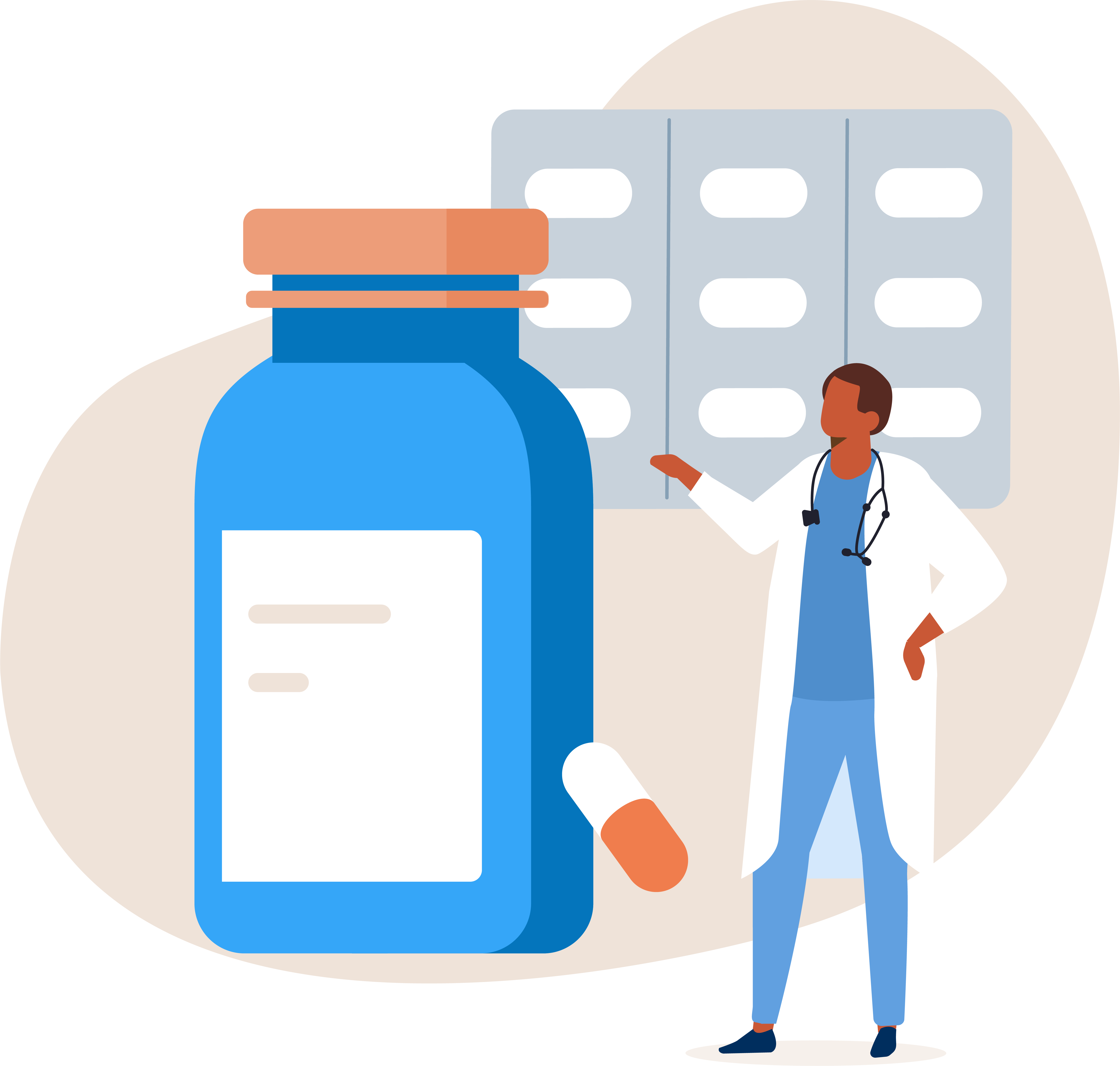
OPEN strives to give patients the tools they need for pain management. Learn about preparing for surgery, talking with your surgeon, strategies to manage pain such as over-the-counter medications, non-medication options, and opioid medications.
Pain after surgery is normal and expected. You may hear it called acute pain, because, while it can cause considerable discomfort, it usually begins to get better a few days after surgery. Before surgery, talk with your surgeon about any medications or substances you take as these may impact your pain control. Ask your surgeon what type of pain is expected after surgery and what you should do to control your pain. Options to control pain may include using over the counter (OTC) medications, non-medication options and if prescribed, opioid medications. If you are prescribed an opioid medication, it is important to know the risks, potential dangers and side effects, and how to minimize risk to yourself and others.
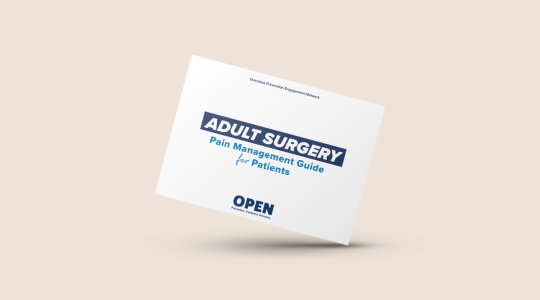
Learn how to prepare for surgery and to help manage pain after surgery.
Each person recovers from surgery in their own way, and someone who has the same procedure might have a completely different experience of pain. Pain after surgery is normal and tells you that your body is healing, and you might need to balance activity with rest. It is an uncomfortable but natural part of recovery. While everyone feels pain differently, typically surgery pain is the worst during the first 2-3 days after and then begins to get better.
The GOAL OF PAIN MANAGEMENT is for you to do activities of daily living like:
Pain may be well-controlled with a schedule of over the counter (OTC) medications like acetaminophen (Tylenol®) and ibuprofen (Motrin®, Advil®). Adding non-medication options to your pain management plan can help to successfully treat pain.
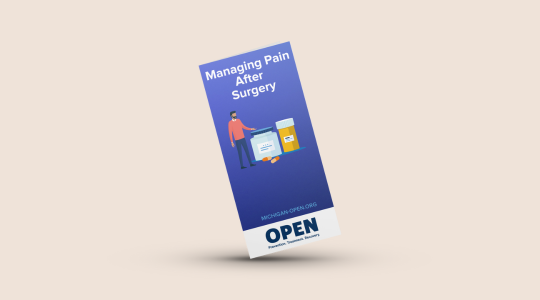
Learn ways to manage pain after surgery such as: over-the-counter medications, non-medication strategies, and opioids, if prescribed.
Ask your surgeon about:
There are many non-medication options that play an important role in managing pain and reducing anxiety. You can use these methods, along with the medications your surgeon has recommended, to help manage pain. Using these methods may allow you to decrease use of opioids or other medications and avoid their side effects.
| Mindfulness or Meditation | Music | Books |
| Calm breathing, like belly breathing or square breathing, can help to relax muscles that are tense because of pain or anxiety. This is called Mindful Breathing. You can also focus your mind and visualize a particular place you enjoy that makes you feel calm, relaxed, and comfortable. | Music may be very comforting when you are experiencing pain or discomfort. Listening to music, singing, or writing songs can help to lessen pain and anxiety. | Before surgery, take time to select a few books that you would like to read while you are recovering. This can help you to feel relaxed and distraction from pain after surgery. |
| Sleep or Relaxation | Ice or Heat | Compression |
| Take time during your recovery to rest and relax. Sleep helps the body heal. | Talk to your surgeon to determine if ice or heat would be helpful to your recovery. | Talk to your surgeon to determine if compression of the surgery area would be helpful to your recovery. Using an ‘abdominal binder’ after surgery can provide comfort especially when moving around. |
| Short walks | ||
| Taking a short walks after surgery is so important! Walking helps to: -Get blood flowing in your body which helps you heal and reduces risk of developing blood clots -Regain your strength and mobility before surgery -Reduce constipation -Improve mood and anxiety |
Using medications like ibuprofen (Motrin or Advil) and acetaminophen (Tylenol), that you can purchase at your local pharmacy, can be very effective at managing your pain after surgery. Each works in different ways to manage pain and can be taken together at the same time.
Ask your surgeon:
Sample schedule and doses for OTC medications:
| Time | Medication (Dose) |
|---|---|
| 9 AM | TYLENOL (1000mg) MOTRIN (600mg) |
| 3 PM | TYLENOL (1000mg) MOTRIN (600mg) |
| 9 PM | TYLENOL (1000mg) MOTRIN (600mg) |
Give the dose your doctor recommends: It is important to use the dose your surgeon recommends even if it is different from the dose listed on the medication bottle.
An opioid is a prescription pain medication that may be prescribed by your surgeon to use after surgery for pain control.
| Generic Name | Brand Name |
|---|---|
| Codeine | Tylenol® #3* or #4* |
| Fentanyl | Duragesic® |
| Hydrocodone | Vicodin®*, Norco®* |
| Hydromorphone | Dilaudid® |
| Methadone | Methadose® |
| Morphine | MS Contin®, Kadian |
| Oxycodone | Percocet®*, OxyContin® |
| Oxymorphone | Opana® |
| Tramadol | Ultram®, Ultracet®* |
*Contains acetaminophen (Tylenol®). Use caution if you’re taking acetaminophen.
Because of their risks, opioids are not usually the starting point to manage acute pain after surgery. OTC medications like Tylenol and Motrin and non-medication strategies should be tried first to manage pain.
| Nausea and/or vomiting | Constipation (difficulty having a bowel movement) | Itching |
| Sleepiness | Slowed Breathing | Impaired motor skills, thinking or judgment. Teens should not drive while using an opioid. |
 |
Contact your surgeon if you notice any of these side effects.
Anyone who uses an opioid, even for just a short time, is at risk for dependence, tolerance, misuse, addiction, and overdose. This risk may be higher in individuals with a history of:
When an opioid no longer has the same effect on your pain as it first did, which means you need a higher dose to control pain. For example, if you are taking an opioid which first worked well for pain, and then later it doesn’t work as well, it does not always mean the pain is worse. Instead, you may have become tolerant to the opioid.
When your body has started to rely on the opioid to function. This can happen even with using an opioid for a short time period, but the longer you take an opioid, the higher the risk. This is one reason why it is important to use an opioid for as short a time as possible. Suddenly stopping an opioid when a person is dependent causes symptoms of withdrawal, such as muscle aches, yawning, runny nose and tearing eyes, sweating, anxiety, difficulty sleeping, nausea/vomiting, and/or diarrhea.
When you take the opioid you were prescribed at a higher dose, more often, or for reasons other than which it was prescribed.
When you develop a brain disease known as Opioid Use Disorder (OUD). People with this condition seek and use opioids even though they are causing them harm.
When you take a dose of medication that is too high for them. This affects breathing and can cause your child to stop breathing.
When anyone other than you gets and uses the medication that was prescribed to you. This can happen when you do not safely dispose of an opioid or leave it unattended. Diversion is dangerous because it can lead to misuse, overdose and/or opioid use disorder in others. Sharing or selling an opioid is a felony in the state of Michigan.
Opioids can cause slowed breathing and lead to overdose and death. Discuss the following signs and symptoms of an overdose with your family and friends. Cannot be awakened or are unable to speak
Talk to your surgeon about a prescription for Naloxone which is a medication that can temporarily reverse the dangerous effects of an opioid overdose. Learn more about this medication with OPEN’s Naloxone Initiative.
Healthcare providers can find current evidence to support appropriate opioid prescribing, best practices for pain management, opioid prescribing recommendations which can be tailored to meet patient needs, counseling suggestions to educate patients on postoperative expectations, and care coordination strategies to manage complex care needs.
Reducing opioid prescribing improves the safety for patients, families, and communities
Prescribing more opioids does not improve patient satisfaction
Prescribing fewer opioids initially does not correlate with an increase in refill requests
New persistent opioid use is one of the most common surgical complications
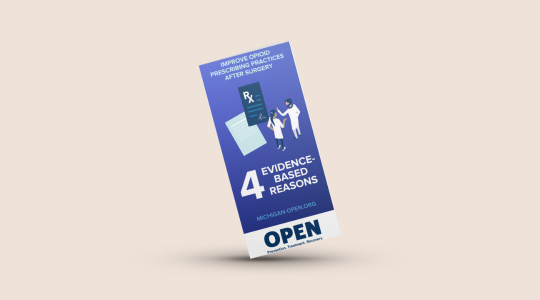
Explore 4 evidence-based reasons to improve opioid prescribing practices after surgery.

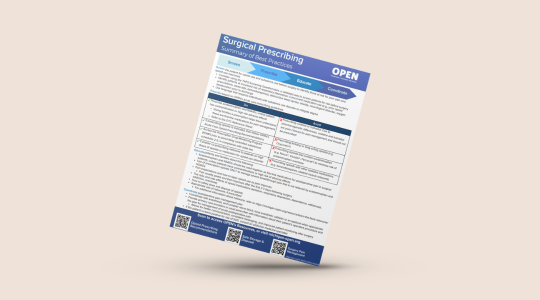
Stay up to date with OPEN’s summary of best practices for prescribing after surgery.
Screen for opioid use and substance use before surgery to identify those at risk for poor pain and opioid use outcomes:
Prescribe using OPEN’s guidance:
| DO | AVOID |
|---|---|
| Prescribe acetaminophen and NSAIDs, unless patients have contradictions or high risk adverse effects. Giving families a prescription helps them understand these are the first-line medications for pain management. Refer to the OTC Quick Reference Sheet | Prescribing codeine or tramadol. Due to pharmacogenetic differences, codeine and tramadol are poor choices for pain management and should not be prescribed |
| If prescribing opioids is indicated, then follow OPEN's Acute Care Opioid Prescribing Recommendations | Prescribing fentanyl or long-acting opioids (e.g. OxyContin®) |
| Access the prescription drug monitoring program (PDMP) prior to prescribing controlled substances schedules 2-5, in compliance with state law | Prescribing opioids that contain acetaminophen (e.g. Norco®, Vicodin®, Percocet®) to minimize risk of acetaminophen overdose |
| Consider co-prescribing naloxone to patients on high doses of opioids or Medications for Opioid Use Disorder | Prescribing opioids with other sedative medications (e.g., benzodiazepines, skeletal muscle relaxants) |
Educate patients and families:
Coordinate postoperative pain management plan
Since acetaminophen and ibuprofen are available over the counter and don’t require a prescription for patients to use, patients and their caregivers often do not receive instructions on how to use them after surgery. The packaging instructions for acetaminophen and ibuprofen provide minimal dosing and recommend as-needed use. If these instructions are followed, patients may be underdosed and inadequately addressing their pain. In addition, if patients were prescribed an opioid, they may think this is the first medication they should use for their pain, not understanding that acetaminophen and ibuprofen often provide adequate pain relief when appropriately dosed and that an opioid may not be needed.
*Unless contraindicated
Even though available OTC, acetaminophen and ibuprofen can be sent electronically as prescriptions to a patient’s pharmacy. When acetaminophen and ibuprofen are written as prescriptions and instructions on how to use them are provided, patients and caregivers then have clear information regarding dosing and understand these are the first-line medications for pain management. Some insurance companies may cover the cost of these medications when they are written as a prescription.
| Medication | Usual Dose | Max Daily Dose (mg) | Common OTC Formulations |
|---|---|---|---|
| Acetaminophen | 1000mg three to four times per day | 4000mg | Tablet: 325mg or 500mg Capsule: 325mg or 500mg Oral solution: 160mg/5mL Extended release tablet: 650mg |
| Medication | Usual Dose | Max Daily Dose (mg) | Common OTC Formulations |
|---|---|---|---|
| Celecoxib* | 100-200mg two times per day | 400mg | Capsule: 50mg, 100mg, 200mg, 400mg |
| Ibuprofen | 400-800mg three to four times per day | 3200mg | Tablet: 200mg, 400mg, 600mg, 800mg |
| Naproxen | 200-400mg two to three times per day | 1375-1500mg | Tablet: 220mg, 250smg, 275mg, 375mg, 500mg, 550mg Capsule: 220mg Extended release tablet: 375mg, 500mg, 750mg |
| Ketorolac | 10mg four times per day | 200mg | Tablet: 10mg |
| Meloxicam | 15mg daily | 15mg | Tablet: 7.5mg, 15mg Capsule: 5mg, 10mg |
| NSAID Risk | Caution |
|---|---|
| Cardiovascular | Short-term use is safe for most patients. In patients who have CVD or risk factors for CVD, long-term and high dose NSAID use can increase risk for cardiovascular events (e.g. MI, CVA, CV death). Avoid use in patients who have undergone CABG surgery. |
| Gastrointestinal | Short-term use (<=7days) is safe for most patients. Long-term use risk is low (<2%). In patients >60 years of age, history of peptic ulcers, gastrointestinal bleeds, or Helicobacter pylori infections, consider celecoxib (Celebrex) and/or use of a concomitant proton pump inhibitor (PPI, e.g. OTC omeprazole). |
| Renal | Acute kidney injury from NSAID use can occur in those with risk factors including patients age >= 65, pre-existing kidney impairment, or CKD with high cumulative doses (e.g. ibuprofen 700 mg/day). Use with caution in patients with CKD. |
| Bleeding | Anti-platelet effect is due to COX-1 inhibition, but NSAIDs block COX in a reversible fashion. Normal platelet function returns within 1-3 days depending on the drug (e.g. 1 day for ibuprofen, 2 days for naproxen, diclofenac, and 3 days for piroxicam). |
| Pregnancy | Avoid use of NSAIDs in pregnancy and consult an obstetric specialist. |

This free, 3-hour CE course will empower surgical providers to directly impact the opioid epidemic by learning best-practice care strategies.
See OPEN’s Prescribing Recommendations Initiative for more information.
Prescription drug monitoring programs (PDMPs) are state-level electronic databases that track prescriptions for controlled substances such as opioids11. All 50 states and the District of Columbia have implemented PDMPs in an effort to improve risky opioid prescribing practice and keep patients safe and informed12.
In Michigan, the PDMP is the Michigan Automated Prescription System (MAPS). Michigan law requires that a query of MAPS be performed when an opioid supply of three days or more is prescribed for a patient. It is good practice to check MAPS prior to prescribing any opioid or controlled substance, regardless of duration. See OPEN’s Public Health Policy Initiative for more information.
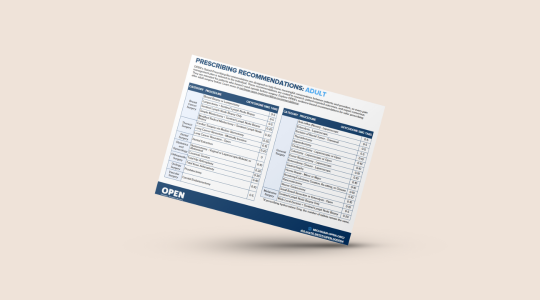
Use OPEN’s evidence-based prescribing recommendations for tailored pain management after surgery in adult patients.
As prescribers write for fewer opioids, there may be concern about possible increase in phone calls for refills or inadequate pain management. However, OPEN research shows that with appropriate patient education, not only did patients consume less medication, but requests for refills did not increase and patient satisfaction was unchanged. To ensure appropriate pain management, all patients and support person(s) should receive preoperative counseling about postoperative pain and how to manage it.
Talk about the experience of pain and usual length of recovery with the patient and their support person(s).
Discuss use of the over-the-counter medications.
Explain when opioids should be used.
Talk about the possible risks associated with opioids.
Let patients know that they should dispose of medications after their acute postoperative pain has resolved, and how they should do this.
Among surgical patients who develop new persistent opioid use, surgeons provided the majority of opioid prescriptions during the first three months after surgery. By 6 months after surgery, surgeons provided 20% or less of opioid prescriptions, and primary care clinicians increased to over 50% of prescriptions 12 months after surgery13.
While a prescription from a surgeon may be the initial point of opioid exposure for a patient, the relationship a surgeon has with a patient is often episodic and as a result, signs of ongoing use or misuse may not be identified. A primary care provider has a longitudinal relationship with the patient and can be better equipped to identify persistent use, misuse, or onset of substance use disorder. However, primary care providers are often unaware that their patients have received an initial opioid prescription from their surgeon. Providing a primary care provider with information about their patient’s operative procedure and the plan for management of acute postoperative pain (especially if that plan includes an opioid prescription) allows for better communication, consistent messaging, and improved patient monitoring after surgery.
The goal of this communication is to let the primary care provider know that their patient had surgery, when it occurred, the plan for pain management, whether an opioid was prescribed and, if so, how much was dispensed, and the expectations in terms of pain duration and plan for refills (if any).
Ideas in terms of sharing this information include using the capability of the electronic medical record to auto-populate a letter or communication to the primary care provider containing this information. If an after-visit summary is created by your electronic medical record, you might forward a copy of this automatically to the primary care provider. Providers could also add standard language to their operative notes containing this information and forward the operating report to the primary care provider.
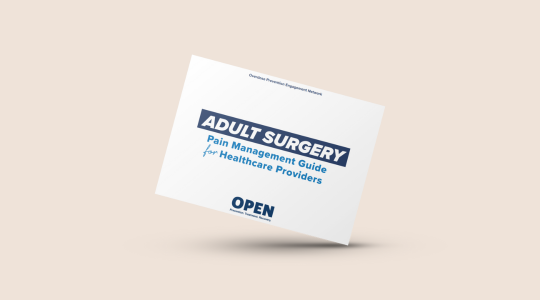
As a healthcare provider, learn evidence-based approaches to help manage your patient’s pain after surgery.

Learn ways to manage pain after surgery such as: over-the-counter medications, non-medication strategies, and opioids, if prescribed.
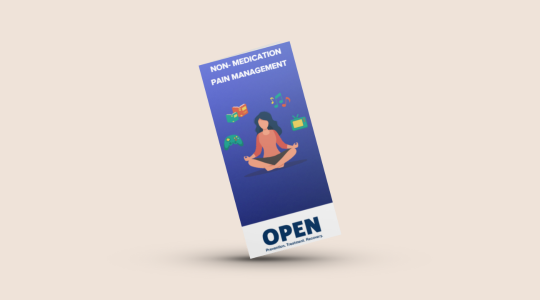
Learn how to help manage or reduce your pain and anxiety through various techniques.

Explore 4 evidence-based reasons to improve opioid prescribing practices after surgery.

Use OPEN’s evidence-based prescribing recommendations for tailored pain management after surgery in adult patients.

Stay up to date with OPEN’s summary of best practices for prescribing after surgery.
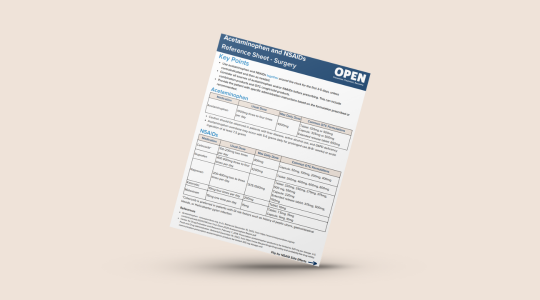
Learn more about prescribing acetaminophen and NSAIDs for pain management after surgery.